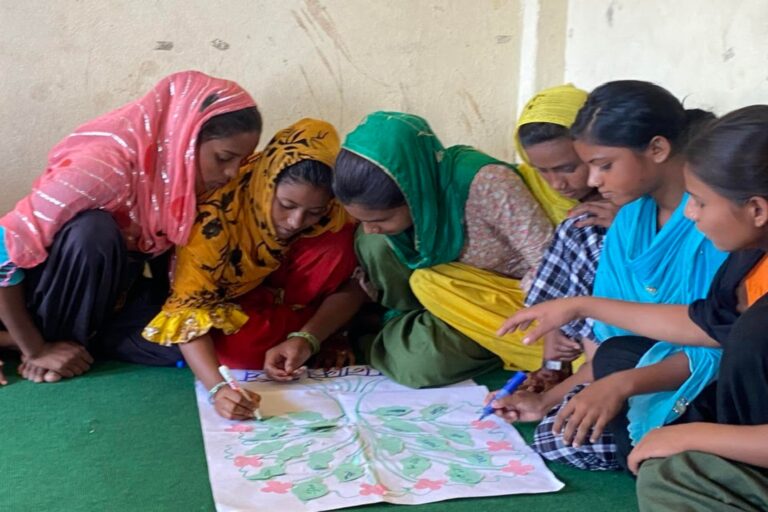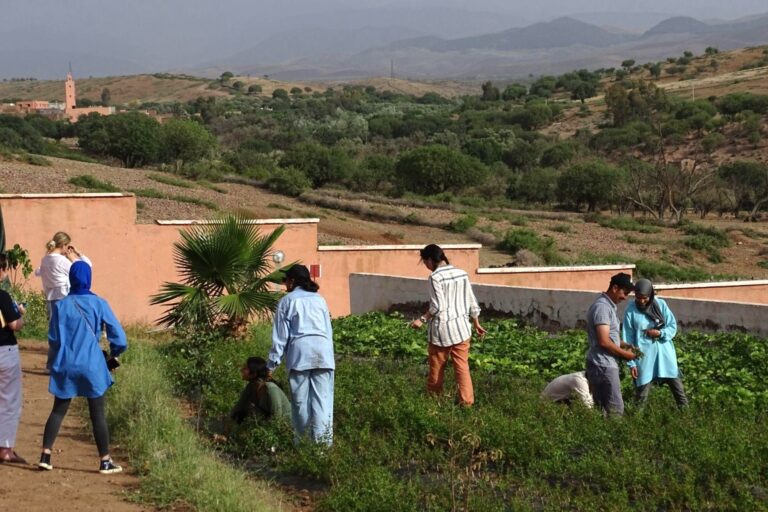Photo Credit: Deeba Yavrom
Note: The following piece is part of the SAIS Review‘s first web series on the topic of Sustainable Development and the Millennium Development Goals. For more information, please refer to the Sustainable Development web series page.
By Saumya Kurup
GOAL: Ensure sustainable consumption and production patterns.
TARGET: Encourage companies, especially large and trans-national companies, to adopt sustainable practices, to integrate sustainability information into their reporting cycle, and to participate in the Sustainable Consumption and Production (SCP) Clearinghouse.
Summary
Sustainable development requires a shift away from current, unsustainable production and consumption practices. These unsustainable practices contribute to inefficient use of resources, lost economic opportunities, environmental damage, and poverty and health problems. True sustainable progress on other aspects of development, such as poverty and the environment, is not possible without explicitly changing the underlying structural problems in production and consumption. Private companies, especially large ones, are intrinsically tied to current production and consumption patterns, and thus must be part of the change to sustainable practices. The adoption of a sustainable development goal (SDG) on sustainable production and consumption, with a target focused on the involvement of companies, is crucial to the success of the post-2015 sustainable development agenda.
Background
Unsustainable production and consumption practices are at the heart of a host of problems, particularly environmental ones. They waste resources, contribute to the degradation of environmental and social ecosystems, and increase vulnerability. Given the world’s growing population, demands for economic development in developing countries, improved living standards, and the looming dangers of climate change, the ramifications of inefficient and shortsighted production and consumption practices are increasingly evident.
Most facets of development are impacted by these practices and, as a result, suffer from wide-ranging ramifications. Currently, approximately one in nine people suffer from chronic hunger.[1] Yet, food waste is a major problem globally—approximately 1.3 billion tons, or one-third of all global food production, is wasted every year.[2] Food waste is often a result of both inefficient production and consumption. In India alone, approximately 30 percent of all produce spoils before it reaches markets, due to inefficiencies in the supply chain and a lack of storage and cooling facilities.[3] Farmers who grow this food lose out on potential revenue and the investment of resources, such as water, that went into its production. In other countries that have better preservation and distribution systems in place, large volumes of food simply go to waste after being bought. In the United States, approximately 40 percent of food supply was discarded in 2009 throughout multiple levels of the supply chain, particularly by consumers. This food waste accumulates in landfills, where it decomposes and releases methane, a greenhouse gas with over twenty-five times the warming effect of carbon dioxide.[4]
Many other sectors of development also suffer from unsustainable practices, ranging from the use of valuable resources for ill-suited products, such as the use of hardwood from virgin forests in paper mills, to the overuse of a resource, such as the greater amount of coal needed for one unit of production in inefficient plants. Modern life is shaped by these practices, so a truly effective effort to improve resource management and decrease environmental degradation while simultaneously improving economic development will require an overhaul of the current norms.
Opportunity
Various sectors of the international community are mobilizing to address post-2015 plans to combat environmental degradation while continuing economic development. For this to succeed, sustainable consumption and production (SCP), needs to become the norm. The importance of SCP for post-2015 sustainable development agenda was addressed at the 2012 United Nations Conference on Sustainable Development, also known as Rio+20. Rio+20 marked the twentieth anniversary of the 1992 United Nations Conference on Environment and Development, also known as the Earth Summit, and focused on two themes: a “green economy” to develop sustainably and eradicate poverty; and an international institutional framework for sustainable development.[5] The 10-Year Framework of Programmes on Sustainable Consumption and Production (10FYP) was one the conference’s major outcomes.[6] Its goal is to decouple economic growth and environmental degradation, primarily by paving the way to an accelerated transition to an eco-efficient economy.[7] Multiple parts of this framework have been rolled out already—including the Global SCP Clearinghouse which acts as the information platform for the 10FYP. Part of the Clearinghouse’s mission is to share and find information on SCP globally and to build capacities for sustainability.[8]
The adoption and rollout of the 10FYP and its various parts are the integral elements of the global movement to transition to a “green economy” by combining economic growth, environmental protection, and social inclusion. Increasing the sustainability of production and consumption has economic opportunities for new business practices, new routes of innovation, growth in sectors, and improved efficiencies. This has recently been taken one step further: the Global Commission on the Economy and Climate launched its flagship project, the New Climate Economy, in September 2013, and published its report in September 2014. The Commission consists of an International Council made up of former heads of government, finance ministers, and leaders in economics, business, and finance; a partnership of seven prominent economic and policy research institutes from six continents; a core project team; and an Economic Advisory Panel comprised of leading economists from around the world.[9] The New Climate Economy’s reports and recommendations on actions and policies that address climate issues while being compatible with strong economic performance are expected to further strengthen political and economic support for improving and mainstreaming SCP, especially considering the influential members that make up the Commission.
Additionally, several ambitious goals were agreed to at the recent 2014 United Nations Climate Summit, including pledges by large multinational companies to reduce net deforestation to zero in their supply chains of major agricultural commodities like beef and palm oil by 2020.[10] The significance of these pledges should not be understated. Large multinational companies are the drivers and shapers of currently embedded supply chains and production and consumption norms. Their commitment to tracking their supply chains—which are often complex, opaque, and travel through multiple countries’ markets with limited means of properly regulating the legality of the harvest and use of resources—gives a great deal of momentum to SCP elements, such as eco-labeling and certification, sustainable procurement, waste management, sustainable resource management, and resource efficiency. The market power of these companies is vast. Long-term international support for and focus on SCP is crucial for maintaining momentum, tracking these companies’ progress on their pledges, building the supplementary sectors and economic opportunities that will arise, and making progress on the agreements made at the United Nations Climate Summit and other international conferences.
Goal and Targets
To ensure the post-2015 development agenda tackles the structural issues that underpin current unsustainable development practices, it is imperative that one of the SDGs explicitly addresses SCP. To this end, the secretary-general should support the Open Working Group on SDGs’ recommended goal to “Ensure sustainable consumption and production patterns” for inclusion in the formal post-2015 international development agenda. The following target should also be adopted for that goal: “Encourage companies, especially large and trans-national companies, to adopt sustainable practices, to integrate sustainability information into their reporting cycle, and to participate in the SCP Clearinghouse.” This target is a modification of a version proposed by the Open Working Group, with the addition of participation in the SCP Clearinghouse as an important indicator of ensuring SCP patterns. Participation in the SCP will enable the companies to develop and evolve their methods of reporting sustainability information and enhance their capacity to shift to SCP practices. It will also strengthen the SCP Clearinghouse’s effectiveness and increase transparency regarding the concrete measures being taken by companies to fulfill SCP-related promises.
This goal and target will ensure that SCP and ways to achieve it are in the spotlight from 2015 to 2030. Since SCP affects many other development challenges, such as poverty, financial inclusion, food security, energy, and pollution, it is imperative that the international community explicitly addresses the embedded, institutionalized unsustainable production and consumption practices that permeate the global economy and leave the world increasingly vulnerable. The involvement of the private sector, especially influential large and trans-national companies, will ensure that multiple influential levels of the international community are involved and that market forces also support changes from unsustainability to SCP. Existing efforts, such as the 10FYP, will also be strengthened by the increased adoption of SCPs and the availability of sustainability information from the companies’ reporting.
Saumya Kurup is a second-year MA candidate at the Johns Hopkins Paul H. Nitze School of Advanced International Studies.
Citations
[1] “Hunger Statistics,” World Food Programme, 2014, http://www.wfp.org/hunger/stats.
[2] “Minimizing Food Waste,” United Nations Environment Programme, http://www.rona.unep.org/?q=node/30.
[3] “FDI in retail sector,” IE Lobbying, 2012, http://ie-lobbying.net/euromediations/files/2012/12/india_fdi_in_retail_sector.pdf.
[4] Dana Gunders, “Wasted: How America Is Losing Up to 40 Percent of Its Food from Farm to Fork to Landfill,” National Resources Defense Council Issue Paper, August 2012, http://www.nrdc.org/food/files/wasted-food-IP.pdf.
[5] “About the Rio+20 Conference,” Rio+20 United Nations Conference on Sustainable Development, 2012, http://www.uncsd2012.org/about.html.
[6] “United Nations Conference on Sustainable Development, Rio+20,” United Nations Department of Economic and Social Affairs: Sustainable Development Knowledge Platform, 2012, https://sustainabledevelopment.un.org/rio20.
[7] “ABC of SCP: Clarifying Concepts on Sustainable Consumption and Production Towards a 10-Year Framework of Programmes on Sustainable Consumption and Production,” United Nations Environment Programme, 2010, http://www.unep.org/10YFP/Portals/50150/downloads/publications/ABC/ABC_ENGLISH.pdf.
[8] “About Us,” SCP Clearinghouse, last modified 2015, http://www.scpclearinghouse.org/d/the-clearinghouse/43-about-us.html.
[9] “About,” The New Climate Economy: The Global Commission on the Economy and Climate, last modified 2015, http://newclimateeconomy.net/content/about.
[10] “FORESTS: New York Declaration on Forests – Action Statements and Action Plans (Provisional Copy),” United Nations Climate Summit 2014, 23 September 2014, http://www.un.org/climatechange/summit/wp-content/uploads/sites/2/2014/09/FORESTS-New-York-Declaration-on-Forests.pdf.



